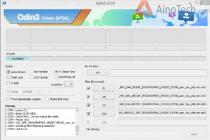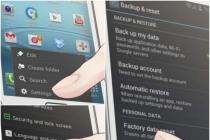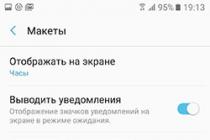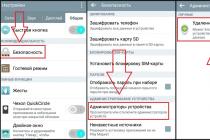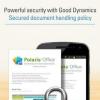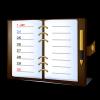Today I want to touch on a very important topic that concerns any user working on a computer and having an Internet connection.
And this topic concerns passwords, which are required from us to enter almost all services, from e-mail and social networks to a personal account on the website of public services.
And, although the password policy on many sites may differ slightly (which characters when entering a password can be entered and which cannot be entered), without exception, all services insist that we use complex passwords.
Very often we just ignore this warning. Why? In my opinion, for two reasons.
The first reason is simply laziness.
Well, the second reason, rather partially, stems from the first. It's much easier for us to remember simple password "123456 " or "Qwerty", since it is simple and convenient for us to press 6 keys in sequence, than to memorize complicated password type "! QjhRt ^ [email protected]» , consisting of 15 characters (, numbers and special characters). Moreover special characters for this password ( !^& and @ ) you still need to find it on the keyboard, which is not always possible from the first, second, and sometimes even the tenth time (your humble servant is no exception to this rule).
So why should you enter complex passwords? How do you make a strong password easy to remember?
I want to talk about this and many other things with you in this lesson.
First, about logins
The Internet is remarkable in that we ourselves can come up with a "name" under which we will, firstly, be recognized on the Internet, and secondly, we will enter into forms in which we are asked to enter our username and password.
This may be your real name, or it may be some original one invented by you.
There are some problems with real names on the Internet today. Real names are practically all busy. What do you mean "busy"?
One illustrative example is the creation account e-mail on any postal service.
For example, I want to create a mailbox on the yandex.ru mail service. And I want mine email address was [email protected]
Nice, understandable, recognizable and easy to remember.
I'm trying to do it. I enter into the field "Create a username" your name in Latin - Oleg.

The service tells me that "Sorry, login is busy"... And he offers me 10 options for free logins.
But they all do not suit me for one simple reason - they are too long. Moreover, it offers to enter your mobile phone number as a unique login. It turns out that everyone who will receive my letters will know my mobile phone number. Do you want that? For example, I don’t want to.
OK then. I will overcome my laziness and bias towards long logins and add my last name with a dot. Judging by the options offered by the service, you can use the dot in the login. I enter Oleg.Ivashinenko.

The result is similar to the previous one. It turns out that the Yandex mail service already has an account with the same first and last name.
It means that you need to come up with your own unique name, which, most importantly, I liked myself.
At one time, I racked my brains for a long time how to come up with such a name so that I would not forget it for sure and so that it would be more or less sonorous.
In the end, I took the first two letters of my name and surname and it turned out Nick(nickname - from English nickname, which means "another name", "nickname") oliv.
But over time, this nickname was also busy on the services where I registered. Then I added two more letters from my middle name and got a nickname olivur.
For the last 10 years I have used this nickname without any problems when registering. So if I have a postal email address like [email protected], that would be nice too.
I enter into the form my original, as I believe, login "olivur".

Busy too. I don't want to give up. I add the magic seven to the name.

Everything worked out. Basically, the email address [email protected] looks good too. You can continue to register.
True, I will not do this, since on Yandex I already have 2 mailbox... So far enough. Let's move on to passwords.
I have nothing to hide. I am an honest person.
Very often on various forums, especially on the forums on the safety of working on a computer and on the Internet, I often come across comments like “I have nothing to hide. I am an honest person."
And, although I usually do not comment on such statements, once I still could not resist and wrote something like the following: “Well, since you have nothing to hide and you are an honest person, then write your login and password from this forum where we communicate. "
What do you think was the answer to my comment? Right. Did not have. So there is something to hide. And since there is something to hide, it means that in the context of this phrase, the member of the forum is no longer an honest person.
Okay, this is all sophistry.
In fact, all information concerning each user should still remain confidential. Starting from the passport number and TIN and ending with an e-mail address, as well as logins and passwords for various resources and services on the Internet.
At the initial stage of mastering a computer, it is really difficult to understand why you need privacy. But with time, understanding will come.
Here are some examples of my own.
For the second year now, I do not go to the post office or to the Savings Bank to pay receipts for utilities.
I make all payments from home from my home computer. These are the so-called online services of various banks.
Russian Standard Bank calls its service "Bank in Your Pocket", VTB24 calls it Telebank, and so on. And, although the names may be different, the essence is the same - everything is very convenient and transparent.
To conduct financial transactions, I have three plastic cards - salary, debit and credit.
I use my debit card as a "Savings Book" and very rarely pay in the store. Very comfortably. No fees are charged for maintaining the card and account. And interest is also added to the accumulated funds.
I pay all payments with a salary card. Well, if suddenly the time comes to pay the receipt, and there is nothing on the salary card, then I pay with a credit card. Well, from the next salary I'm already transferring to credit card the required amount so as not to withdraw interest.
So why am I telling all this?
I do all this (payment of utility bills using ready-made templates, transferring money from one account to another) in the personal accounts of the respective banks. Well, access to these personal accounts carried out by logins and passwords.
Since this is my personal finances, I am very much interested that no one except me knows my credentials in these banks. And, although when performing financial transactions, banks require confirmation codes that they send me via SMS to mobile phone, I have quite complex passwords.
And, although, just in case, they are written in my place, I remember these passwords. But more on that later.
Another telling example.
Just recently, I registered on the government services website. It turned out to be quite interesting and necessary for me, in any case, a portal.

I was surprised to find that I had a tax debt. But the surprise quickly passed, as I remembered that I had paid the land tax too late. And the penalty went to me. My debt to the state a month ago was already 12 rubles. 75 kopecks
At the same time I looked to see if I have traffic fines. It turned out that there is one. Although I have not received any paper by mail yet.
Although I am not going abroad yet, I have paid these debts to keep my soul calm.
The resource turned out to be interesting. You can easily make an international passport, register the car, enroll your child in kindergarten, etc. etc.
So, as login this resource uses the number SNILS a. This login is really unique and only I know it.
SNILS is the Insurance Number of the Individual Personal Account of the insurance certificate of state pension insurance. Well, so that no one had access to my personal information, I had to come up with a really complex, but memorable password.
How passwords are cracked
I am not a hacker or a computer security expert. But the basic principles information security familiar to me. And you should know them. This will help save a lot of nerve cells in the future.
I will not deny that a hacker (a leading security expert computer systems), if he wants to hack your computer, he will do it. Provided, of course, that you yourself are not an expert in this area.
One consolation. To be honest, hackers absolutely do not need me or you. Take my word for it. They have global interests.
But as for us, mere mortals, programs that are quite common on the Internet that are available to any user work with us.
I have already described how such programs get to our computers in the lesson "". Therefore, I will not repeat myself.
Now I want to tell you about one of the types of such programs that are engaged in the selection of passwords on various information resources.
This type of program is called "Brute force"... This name comes from a combination of two English words "brute force" which mean "Full search" or "Brute force method".
Such programs for guessing passwords use special "Dictionaries"... What are dictionaries?
A "dictionary" is an ordinary text file (or several files), each line of which contains a "word". For example:
password
So that's it. Such programs in turn take each "word" from such a "dictionary" and substitute it in the password field until this "word" matches the "word" you have invented that you use as a password.
Depending on the complexity of your password, such a program may take from a few seconds to hundreds of years. And then he will not be able to pick up at all.
So if you have a password "Qwerty" or let's say "Z, kjrj"(word "Apple" typed in English), then this type of program will take seconds to find a password.
So what do you do? How do you know how simple or complex your password is?
In fact, not everything is so bad and gloomy.
Coming up with a complex password
Computer security specialists are not sitting idly by either. They are constantly analyzing various malware programs. In particular, programs like "Brute force".
And at the moment there are already a lot of resources on the Internet where you can check the uniqueness of your password.
Let's take one of these resources as an example and see how to create a "complex" but easy-to-remember password for yourself.
As such a resource, we will choose http://password.ru/ (More services for checking password strength: 2ip.ru, howsecureismypassword.net)
Another resource, the link to which was sent to me by the reader Mary: https://ru.vpnmentor.com

I will tell you about one of the algorithms. But you can show your imagination and come up with your own algorithm.
Let, for example, your name is Ivanov Ivan Ivanovich. We "invent" a password by last name, since we remember this word for sure from childhood - ivanov

Judging by the site's response, it will take less than a second to crack such a password. Add an exclamation mark (or any other special character) before the last name - ! ivanov

Better now. To crack such a password, the program will need 12 minutes 57 seconds.
Add an exclamation mark after the last name - ! ivanov!

It turns out, too, a not very complex password, which can be cracked in 12 hours and 31 minutes.
Add to the end of the number 12345 - ! ivanov! 12345

As you can see from the message, such a password can be cracked in 7 and a half million years.
Although the password is complex, it is easy to remember. I myself use such algorithms for composing passwords.
There is another option for creating complex passwords that is easy to remember.
For example, this morning before work, the cartoon "The Scarlet Flower" was shown on TV. Isn't it a password? Easy to remember.
But in the forehead, of course, it is not advisable to leave such a password. Let's change it. Let's type the name of the cartoon in English with a small letter without a space: fktymrbqwdtnjxtr and check it out on the website.

It will take about half a million years to crack such a password.
As you can see, it is not at all difficult to come up with a complex, easy-to-remember password.
That's all for today. Good luck and creative success to everyone. 🙂
Best regards to all my readers and subscribers
Oleg Ivashinenko
If you liked the article, share it with your friends on social networks.
To record 15 comments
Nowadays it is impossible to imagine life without a computer and constant inputs of various combinations. We need it almost everywhere, from starting a computer, registering on sites, logging into forums, mail and social networks, for example, Odnoklassniki, and ending with pages and accounts in electronic wallets. If, with optional registration somewhere, you can not come up with a combination, but specify a random key combination, then when creating a permanent account, especially if it concerns any remittances, then the password must be strong.
What password can you come up with
Any combination can be hacked, and the data can be used by an intruder up to the opening of credits. That is why it is imperative to take care of protection in advance, and change weak combinations to reliable ones.
Cracking passwords
Even an inexperienced hacker can crack easy combinations and combinations in a password. It is very simple by the method of selection and enumeration of all possible options... This is called brute-force. Such as 00000, 11111, qwerty, 123456 and the like are checked immediately, and then various characters are substituted for them. For such enumeration, there are special programs, which takes very little time.
 Another popular hacking method is the analysis of all human data. All relevant information is collected and inserted into the password. This includes initials, date of birth and other information. In this way, you can still pick up the secret question required to recover the password. Where is data about a person collected? Most often in social networks, such as Odnoklassniki, Vkontakte. Here you can find out everything, from the name of the husband, ending with the name of the dog and your favorite musical group.
Another popular hacking method is the analysis of all human data. All relevant information is collected and inserted into the password. This includes initials, date of birth and other information. In this way, you can still pick up the secret question required to recover the password. Where is data about a person collected? Most often in social networks, such as Odnoklassniki, Vkontakte. Here you can find out everything, from the name of the husband, ending with the name of the dog and your favorite musical group.
Storing passwords
Have you created one strong password, two, and the third is no longer remembered? Because of this, many users create combinations, for example: "1 password", "2 password" and so on, for various sites. This is wrong, because if one of them is hacked, then the rest will be easy to hack. To save combinations, start a notebook or file on your personal computer, but not in a visible place for everyone, otherwise some people manage to write passwords on a sticker and stick it on the monitor, and not at home, but in the office. Show the same attitude to "secret questions".

Other ways to create a strong password

How secure is it to store passwords on a computer?
It is unsafe, there are a huge number of programs that contain so-called "key loggers" or are able to search valuable files on your hard drive, flash card or other media. Even if you are protected by your dear ones antivirus software, it is better to play it safe and store information in paper notebooks.
The average European is registered on 26 websites and rarely has more than five different passwords for all occasions. 30% of users keep their passwords on a piece of paper in front of the computer. If one of your accounts is hacked, it is highly likely that fraudsters gain access to the rest of your data.
How to come up with a strong password for mail
DO NOT USE PERSONAL DATA
No maiden names (even mothers), school numbers, pet names, etc. All this about you can be obtained from social networks in an open mode.
NO SIMPLE WORDS OR NUMBER SEQUENCES
"Yutsuken" or 123456789 is not for you. They can be hacked with ease, using brute-force software. So, you can experiment on howsecureismypassword.net to determine which combinations will take how long to match. Of course, you don't need to enter your real passwords there. An ideal password combines both letters, and in different registries (like this, yes) and numbers.
CONTROL WORD
Yes, like in a bank. How do I come up with a strong password? In order not to forget your password, come up with a word that you will constantly use, and the numeric combination to it is a permanent part of the password. And the variable part will be the name of the site where you enter it. For example, we chose the permanent part “ [email protected]". And to register on, say, Facebook, combine the password in “ [email protected] _Fb "
RUSSIAN WORDS IN LATIN
If you have a bilingual keyboard, you can make the task even more difficult. The same word "rainbow" typed in Russian with the English layout enabled will be written as "hfleuf". For password cracking programs, this will complicate the task. The selection algorithm in some of them is primarily based on the dictionary of existing words.
How to come up with a strong password in Odnoklassniki and not only
LETTERS-NUMBERS
First put letters, then numbers. It matters. One password character can contain 10 variants of numbers (0-9) and 26 variants of letters. When the password is brute-for-sign, the program gives the cracker the expected time of cracking. It, on average, ranges from a few minutes to a day. If there are letters at the beginning of the password, then the expected estimated time of cracking is longer. Thus, if your account was not "ordered" personally, but is broken just for the sake of entertainment, the cracker will most likely prefer to look for easier victims.
DIFFERENT PASSWORDS FOR DIFFERENT PURPOSES
What kind of strong password can you come up with? For example, use the base part “ [email protected]"For mail and social networks, let it be basic and permanent. Oh, some " [email protected] _ "- for online stores, where you look once or twice. For online games, where account hacking is a constant phenomenon, get yourself a third type of password.
Let's say a hacker found out the password from your main mail. Here's what he can do:
- Change your passwords for all social networks. Ask all your friends for money on your behalf.
- Change your iCloud or Google Play password. Next, steal money from you or block your smartphone.
- Examine your correspondence, from which a hacker will surely pull out your passport data and card number. From social networks, he can easily get your mother's maiden name.
- Knowing your passport details and card number, the hacker will change the password for the Internet bank, change the contact phone number and be able to freely dispose of all your money.
- If a hacker gets a scan of your passport in the mail, he can take a loan in your name from an unscrupulous credit organization and collectors will come to you.
Ilya Anonymous
Tinkoff Bank employee
Unreliable: words and sequences of numbers
- simple vocabulary words: sexy, love, hello, password;
- a sequence of numbers in a row: 1234, 123456789, 9876543210;
- date of birth: 21041988, 2104;
- any year: 2015, 2010, 1988;
- your name: ilya;
- the names of their relatives and pets: mama, papa, murka, stepka;
- the name of the service you are registering with: mailru.
Reliable: numbers, letters, punctuation marks
- xJ462 & b-vr01.8 ^ 5h;
- hs # lzkAc ~ 6oifL0xwT;
- (|% SJbB7AN ~ T.
Good passwords are composed by cats when they walk on the keyboard:
- s7777, .LW / g000 --- 5255;
- GBz.vURHDG> 923ub4grz.34;
- # $: * (Tg; 9729htgbz1114.
If you just throw your hands on the keyboard a few times, you get a strong password:
- p $ (ghPHg5g79;
- 4ghu; [email protected];
- vd.Kjbk.j4uies $.
Such passwords cannot be found with the help of a dictionary, and it will take months and years to brute force - during this time you will have time to change your password, box and citizenship.
How to compose and remember a strong password
Each person has their own technique for remembering a password. If you haven't, try this one:
- Take a simple phrase that you will remember exactly. For example, "potatoes with mushrooms". Write it: kartoshka s gribami.
- Imagine saying this phrase with an accent. How would you write it then? For example, with an Italian accent: kartOshka s gribammi.
- Replace spaces with some character: dash, period, comma, or worse: kartOshka.s.gribammi.
- Replace any letters with numbers - but in such a way as to remember what you changed. For example, a to @, i to 1: [email protected]@[email protected]
Your password is best remembered when you enter it frequently. If you just composed a password, turn off the "remember me" checkbox in mail or social networks, and you will have to enter it every day. This will teach your hands to enter it automatically. After a week, you can turn on "Remember me" again.
Strong password: alternative method
A couple of months ago, I already talked about a method to come up with a strong password.
- Take the words of your favorite song. For example, "This is not a joke, we met in the minibus at number one, we go and keep quiet."
- We take the first letters: enshmvmpn1eim.
- We translate into the English layout: enshmvvmpn1eim.
- Capitalize the first letters of the stressed words: EnSHmvvMpn1eiM.
- Add your favorite smiley and the age at which you had the first sex: EnSHmvvMpn1eiMX-D29.
- It turned out 19 characters - it will easily fit into the password for Tinkoff Bank.
How to write down passwords
Security experts advise against writing down passwords in plain text, even if you keep them in a safe. If you need to write down a password, make it so that only you know how to read it.
Take an old diary, open it somewhere in the middle or near the end, and write in the margins with a pencil “Potatoes with mushrooms. In Italian, by mail, 1 portion. " This note will help you remember how you changed the original phrase, and it will not be clear to outsiders how to get your password from it.
Never put passwords on stickers on the monitor. Don't carry them in your wallet. Don't jot down notes on your phone.

How not to declassify your password
Even with a strong password, you can be hacked: for example, if someone spies on you entering the password; if there is spyware on the computer from which you access your mail. How to protect yourself from such cases:
- Do not use the same password in mail, bank, social networks and instant messengers. Change at least a third of the password to make it difficult to guess.
- Turn on two-factor authentication wherever you can. Then, even if your password falls into the hands of fraudsters, they will also need your phone to enter the mail or bank.
- Try not to enter passwords on other people's computers, especially if the computer is shared: in an Internet cafe or library. You don't know what spyware might be on them.
- Password protect your home wireless network.
- If you suspect that your password may have been leaked to cybercriminals, change it in a secure environment and from a secure device. For example, at home from a tablet.
- Keep your phone with you, and if suddenly your SIM card stops working, urgently call the operator and change your SIM card in the communication salon. A non-working SIM card may mean that someone has made a duplicate.

There are practically no people left who use the Internet only to search for information. Mail, Skype, social networks - all these systems have become an integral part of the "network" life.
And here we almost at every step come across such concepts as login and password. Without them, you will NOT be able to use either mail, or social networks (Odnoklassniki, Vkontakte, Facebook), or Skype. Not to mention forums and dating sites.
If you think that you are using at least some communication system without them, then you are greatly mistaken. Apparently, your computer is configured in such a way that you do not come across this data.
What is account, login, password
Let me explain with an example of an apartment building. Let's say it has 100 apartments. Each has its own number.
All apartments have approximately the same layout, but each of them is different from the other - different furniture, wallpaper, plumbing fixtures, personal belongings of residents, and so on.
Multi-apartment buildings are also different - three-story, five or more floors, with a different number of apartments and built according to different projects.
Communication services on the Internet are like such houses. In every system, be it mail, skype, social network or something else, have their own "apartments". They are called accounts.
Anyone can get it and “furnish” it at their own will. But for this it is necessary that such a "apartment" be assigned a number and given a key to it. Here the number is the login, and the key is the password.
Login is a unique designation (number) in the system. And the password is the key from this login, that is, what can be used to open it.
Consider an example with email. Let's say you have a mailbox on the Internet. This means that on some mail site (Yandex, Mail.ru, Gmail.com or another) you have your own personal account (apartment). He has a login (number), which opens with a password (key).

Using this data, you enter your email account and work in it - you read and send letters, delete them, and so on. You simply cannot use your mail without a username and password - the mail site will not open it.
This is a general rule for all communication services on the Internet! For mail, skype, pages on social networks (Odnoklassniki, Vkontakte, Facebook and others), forums, chats, blogs and any other places where you can create your own space. Each of these systems has logins with passwords, and if you want to be in it, then you must be assigned these data.
If you don't know the login and password
It often happens that a person uses e-mail, skype or has a page on a social network, but he DOES NOT know either a login or a password. How can this be ?!
The thing is, computers and programs are now very smart. They know how to remember the data that was once entered by them. And every time you open this or that system, it automatically "logs in", that is, enters your account, without even asking who you are.
That is, your data is in the memory of the site or program.

The most striking example is the Skype program. Having opened it, contacts, calls, and correspondence immediately appear on most computers. That is, the program does NOT ask for a username and password from the account - it already remembers them.
It would seem that this is very convenient - you do not need to type every time. But, alas, it is not very safe, especially for novice users - you can easily lose access to your pages.

A few examples:
- A relative came to visit and asked you to use a computer to check your mail or chat on Skype. To do this, he will have to log out of your account, otherwise he will not be able to log into his own. If you do not remember or do not know your data (login and password), then after such a visit, you simply cannot log back in.
- You have a page on Odnoklassniki. You can enter it simply by opening this site. It so happened that one of the family members (spouse, child) also wanted to create such a page for himself. In order to receive it, he must log out of your account. After that, only his page will open on the computer - you may never get into yours.
- The computer has crashed. As a result, you have to call a computer wizard. If something more or less serious has happened and you need to change the system, then you will not be able to open any of your pages / programs.
There are many more similar situations. Almost every day I receive several messages that people cannot enter their mail, have lost a page on a social network, or they cannot open Skype.

The trouble is that very often the login and password cannot be returned and the account disappears forever. And along with it all the correspondence, contacts, files and other information. And all this is due to the fact that the user does not know or does not remember his login information.
Previously, there were no such problems, because sites and programs did not know how to remember this information. That is, a person had to enter their data each time they entered.
Of course, now you can configure your computer in the same way. But this is quite costly, especially if you communicate often.
Getting a new username and password
Let's say I don't have a personal page on Odnoklassniki, but I want to have one. To do this, I need to get my own username and password from this system. The procedure for obtaining them is called registration.
Registration is filling out a short questionnaire in which the user indicates some information about himself. He also comes up with a username and password to enter this system... After correctly filling out the questionnaire, the user is issued a personal account.

On every site where you can get your page for free, there is a registration. It is also found in popular programs (Skype, Viber and others). As a rule, a button with such a name or a corresponding inscription is in a conspicuous place. This is how it looks on the Odnoklassniki website:
![]()
By clicking on it, a questionnaire will open. We fill it in and get an account. In the case of Odnoklassniki, this will be a personal page on this social network.
What should be the login and password
As I already said, when registering in any system (mail, skype, social network, forum, etc.), you must choose your username and password. In fact, you need to come up with them.
Login. This is your unique name in the system. Keyword here - unique, that is, it belongs to you and only you. No other user will be assigned the same name - this is simply not possible.
Therefore, difficulties often arise when choosing it. After all, there are a lot of users, each login is unique and in this regard, all simple names have already been parsed.
Another difficulty is that in most systems this name can only consist of Latin letters and / or numbers without spaces. That is, it is impossible to come up with a Russian version - there should only be English letters.
For example, I want to get a Skype account. When registering, of course, you need to specify a login. I want to choose the name "neumek". Since Russian letters are not accepted, I type neumeka and see that this name is already taken.

What to do. There are two options: either connect your imagination and find a free login by typing, or use one of the names that the system offers.
The fact is that now many sites and programs are trying to help the user in choosing a name. They automatically select and show free options.

I advise you to take your choice seriously and do not spare your time.
Remember: you cannot change your login! You can only create a new account with a new username.
Which login is "good":
- Not very long
- No periods, hyphens, underscores
- Easy to remember
Why is it important. The fact is that often the name in the system plays an important role in communication. For example, the name of the email is formed from it.
Let's say I decided to open my mail on Yandex. I go to the site yandex.ru and register. I choose the name in the system neumeka. So my address new mail will [email protected]
And here people often make a mistake - they choose for themselves, to put it mildly, not very suitable names. All sorts of "handsome", "honey", "kitties" and the like.
For example, I receive a letter from a seemingly respectable person, director of a large company, and he has mail with the login pupsik74. And how can I be serious about this "pupsik" ?!
Logins with numbers are also often chosen. Okay, if they are unchanged, for example, the year of birth. But quite often people indicate the current year (for example, 2015) or the number of their full years. But this figure will change, and the name in the system will remain the same ...
For example, I receive a message from a person with the login natusik12. The first thing I think of is that the user is inexperienced. But this is not the worst thing. The problem is that usually, using numbers in names, people indicate either their year of birth or the number of full years. And I conclude that a twelve-year-old girl is writing to me.
Naturally, I start to consider her age when writing the answer. But it turns out that it's not a girl who writes to me, but an adult woman, a candidate of medical sciences. And I talk to her like a little girl.
How to choose a login... In fact, you can choose absolutely any name. At least kitties, at least with numbers. But it is better to "strain" once - after all, it may well be that you are doing it for many years.
Moreover, it's free. And here mobile operators for example, for choosing nice number they take money on the phone.
When choosing a login, I recommend doing the following: take a few letters of your real name and add a few letters of your last name to them. We try different options (at the beginning, middle, end) until we get a free login. If nothing works out, we connect imagination, but within reason :)
Of course, much still depends on which system you choose your name for. If it is mail or skype, then it is better that it is "good". But if this is some kind of service where communication is not supposed, then absolutely any can be specified.
Yes, and more! It is not at all necessary for the login to be the same on different systems. Therefore, feel free to start different names on different sites - this is a common thing. Indeed, in one system, the selected name will be free, while in the other it may already be taken.
How to choose a password... Let me remind you that this secret code with which you will open your account (mail, page on the social network, skype). This is something like a pin code from a plastic card or a key to an apartment or car.

It should only consist of Latin letters and / or numbers. No punctuation marks or spaces. The case of letters also matters. That is, if a password is assigned with a large (capital) letter, but when typing a small letter, then this will be an error - he will not be allowed into the account.
The password must be complex! Ideally, it should be at least ten characters long, including numbers, uppercase and lowercase letters. And no sequences - everything is scattered. Example: Yn8kPi5bN7
How easier password, the easier it is to crack. And if this happens, the attacker will gain access to the account. And, most likely, you will not even know about it. But a person can, for example, read your personal correspondence or even take part in it.
One of the most common passwords that users indicate when registering is the year of birth. Finding such a "key" is not difficult at all. Still very often they use a set of numbers or letters of the keyboard, arranged in order (such as 123456789 or qwerty).
By the way, you can even find a list of the most common passwords on the Internet. The six most common are: 123456789, qwerty, 111111, 1234567, 666666, 12345678.
Where and how to change username and password
You cannot change your login! You can only create a new account with a new name.

But all contacts, messages, files that were in the old account will remain in it. It is extremely difficult to transfer them, and in some cases it is not possible at all.
Moreover, you will have to warn your interlocutors about the move - they say, do not write to me at the old address, but write to the new one. And it should be borne in mind that some people may ignore this request for one reason or another.
Therefore, if you already have a login, but it is unsuccessful, choose the lesser of two evils. Of course, when there are few contacts and they are not important (or they are not at all), then you can safely get yourself a different name, and forget about the old one. But if the name is for many years and you are actively using it, then it is better to leave everything as it is.
The password, as a rule, can be changed quite easily.... To do this, you just need to open your account settings and select the appropriate item.
Usually, to change it, you need to specify the old version, and then print the new one twice. If the data is entered correctly, then after clicking on the "Save" button (or some similar), the password will change. This means that it will no longer be possible to enter under the old one.



